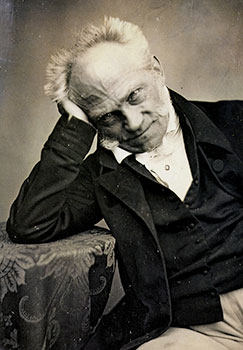 Arthur Schopenhauer, philosopher and curmudgeon, was not spectacularly successful in affairs of the heart. It is true that aged 31 he fell in love with a nineteen year old opera singer, Caroline Richter, and pursued a relationship with her for several years, but this fell apart after he refused to marry her, complaining that "Marrying means to grasp blindfolded into a sack hoping to find an eel amongst an assembly of snakes." Some ten years later, he did manage to proposition a seventeen year old girl, Flora Weiss, at a party, apparently while brandishing a bunch of grapes, but she rejected him, and his grapes, remarking in her diary that she didn't want the fruit, because "old man Schopenhauer had touched them."
Arthur Schopenhauer, philosopher and curmudgeon, was not spectacularly successful in affairs of the heart. It is true that aged 31 he fell in love with a nineteen year old opera singer, Caroline Richter, and pursued a relationship with her for several years, but this fell apart after he refused to marry her, complaining that "Marrying means to grasp blindfolded into a sack hoping to find an eel amongst an assembly of snakes." Some ten years later, he did manage to proposition a seventeen year old girl, Flora Weiss, at a party, apparently while brandishing a bunch of grapes, but she rejected him, and his grapes, remarking in her diary that she didn't want the fruit, because "old man Schopenhauer had touched them."
These setbacks, however, did not prevent the great curmudgeon from opining at length on the character of love and desire. In his essay, "The Metaphysics of Love", Schopenhauer claimed that "every one, in the first place, will decidedly prefer, and eagerly desire, the most beautiful persons"; and, more precisely, will "demand from the other individual especially those perfections which he himself lacks; yes, even find beautiful those imperfections that are opposed to his own. Therefore, small men seek large women; blondes love brunettes, etc."
Luckily for us, Schopenhauer was not content to let matters rest at this level of banality. Rather, his project required that he focus in on the particulars - on the considerations that guide us in our quest for a mate.
Top of the list of desirable characteristics in a woman is youth.
On the whole, it is effective from the years of beginning to those of ending menstruation. However, we give decided preference to the period from the eighteenth to the twenty-eighth year. Outside of those years, no woman can excite us; an old woman arouses our disgust. Youth without beauty, still has its charm; beauty without youth, none.
Once a suitably youthful woman has been identified, it is necessary to check on her health, because while "Acute diseases disturb only temporarily; chronic diseases, or even cachexy, repel...".
The next requirement is a decent skeleton.
Next to old age and disease, nothing so repels us as a deformed figure; even the most beautiful face is no compensation for this defect. Moreover, the ugliest features, when accompanied by a symmetrical body, are absolutely preferred. Furthermore, we are most sensitive to every disproportion of the skeleton, as, for instance, a stunted, short-legged figure, et al., also a limping gait, where it is not the result of an accident. On the other hand, a strikingly beautiful stature can compensate all defects: it bewitches us.
A fourth consideration is a "certain plumpness", and particularly a "full female bosom", which has "an uncommon charm for the male sex". Be warned, though, excessive fatness in a woman will "arouse our disgust" (though, equally, "undue leanness strongly repels us").
The final recommendation is beauty of features.
Here...the bony parts are the most important consideration. A beautiful nose is especially attractive, while a short, pug nose mars all. The life's happiness of innumerable girls has been decided by a slight upward or downward curve of the nose.
Heady stuff, indeed. Happily, men do not entirely escape Schopenhauer's steely gaze, though, surprise, surprise, the considerations that govern how women choose cannot be specified with such a degree of accuracy.
On the whole, the following may be maintained. Their choice is given to men of from thirty to thirty-five years of age; and, indeed, they prefer them to youths, although these represent the highest human beauty... In general, they care little for beauty, especially of the face: it appears that they take it upon themselves to bestow beauty upon the child. They are won principally by man's strength and the courage allied to it: for these promise generation of strong children and, at the same time, a brave defender of them.
In addition, Schopenhauer mentions broad shoulders, narrow hips, straight legs, muscular power, courage and a beard, noting that "women often love ugly men, but never, an unmanly man".
Despite having at least half a beard, Schopenhauer never married. Perhaps this was for the best, though, given his belief that every sexual encounter inevitably ends in disappointment, with lovers "amazed that what was desired so passionately accomplishes no more than any other sexual gratification."
Schopenhauer died at home on his couch in 1860. It is sometimes claimed that he had only a cat for company, which would make for a poetic, if likely apochryphal, end.
(Sources: Arthur Schopenhauer, Selected Essays; Helen Zimmem, Arthur Schopenhauer: His Life and Philosophy).







